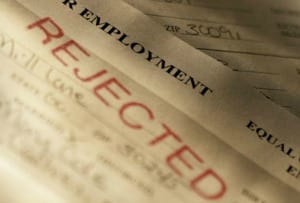Some Employers Believe a Poor Credit Score Indicates Poor Work Habits
Looking for a job isn’t fun, even in the best of times. It’s a lot worse in the worst of times — times like these.
While the national unemployment rate has fallen to its current 7.7 percent level — from a high of 10 percent at the nadir of the Great Recession — finding a job is still an overwhelming challenge for 12 million out-of-work Americans.
And present-day job seekers are carrying an extra – some say unfair – burden: their credit histories.
Using Credit Checks as Job Screens
Today, it is common for employers to look at an applicant’s credit report before making a hiring decision. In fact, based on a survey of 400 employers conducted by the Society for Human Resources Management, approximately 47 percent of employers do credit checks on some or all of their job applicants.
And credit checks are entirely legal. The federal Fair Credit Reporting Act permits employers to request credit reports on all job applicants and existing employees after receiving written permission from the person whose report they seek to review — and they can reject an applicant who refuses to give that permission.
Advocates of using credit scores as a measure of an individual’s fitness for employment maintain that they are valid screening tools that give an employer an insight into an applicant’s character. A poor credit score, it is argued, suggests the possibility of poor work habits or a disregard for making good on commitments.
But critics of the practice respond that credit ratings were never designed to do anything other than give lenders a means to evaluate whether a potential borrower would be a good credit risk; based on someone’s history of paying debts, a lender decides whether or not to make a loan, and if so, on what terms. They were not intended to evaluate a person’s qualifications for a job or his or her ability to succeed at one.
And while many people have recovered from the recession and seen their credit scores recover, the portion of the population with poor ratings, i.e. credit scores under 600, has grown from about 15 percent before the crash to about 25 percent in 2011. That means that today, there are millions more Americans whose degraded credit score may be undermining their chances to find employment.
What Credit Reports Actually Show
And yet, an unbiased look at credit reports suggests that they are really better at showing the results of a staggering economy than they are at highlighting undesirable work behaviors.
In fact, according to a new study of nearly 1,000 low- and middle-income families by the research and policy group Demos, most of those surveyed who suffered declining credit ratings during the past few years had either lost a job, incurred debt when they or a family member got injured or sick (especially if they lacked health insurance), or were supporting one or more minor children.
Not surprisingly, when any or all of the above situations occur, the likelihood of being in debt increases.
According to the Demos study: 31 percent of households who have had a member out of work for two months or longer in the past three years, reported that their credit score had declined over the same period of time; households that include someone without health coverage were twice as likely to report declined credit scores; and 23 percent of indebted households raising children described their credit scores as poor, compared with 12 percent of indebted households without kids.
So, ironically, the people who may be most in need of employment are precisely those who have been victimized the most by forces outside of their control: job loss, sickness and family responsibilities. But now their credit reports are also being used as weapons against them, further punishing them by keeping them unemployed.
The Catch-22 is unmistakable: A large number of job seekers are unable to secure work because of damaged credit, yet are unable to escape debt and improve their credit because they cannot find work. One in seven respondents in the Demos study who have poor credit say that they were told they would not be hired for a job because of information in their credit report.
Changing the System
Critics of the present system offer several possible remedies. Because, as the Demos study also showed, African-American families were the hardest hit by the country’s economic woes, and thus have suffered disproportionally from declining credit scores, the Equal Employment Opportunity Commission could seek to ban the practice, outright, on discriminatory grounds.
Or more states can join California, Hawaii, Washington, Oregon, Illinois, Maryland and Connecticut in passing legislation that limits the use of consumer credit reports in connection with hiring and personnel decisions.
Or Congress can enact federal legislation that plainly states that, except in clearly defined circumstances, no one should be denied work based solely upon their credit score. Currently, a law to do just that, H.R. 645, the Equal Employment Act for All, sponsored by Congressman Steve Cohen, D-Tenn., is being considered by the House Financial Services Committee.
But its chances of passing are poor. Between 2011-2013, only 11 percent of all House bills made it past committee, and only 3 percent were enacted into law.
So much for Washington’s oft-stated desire to “put Americans back to work.”


















